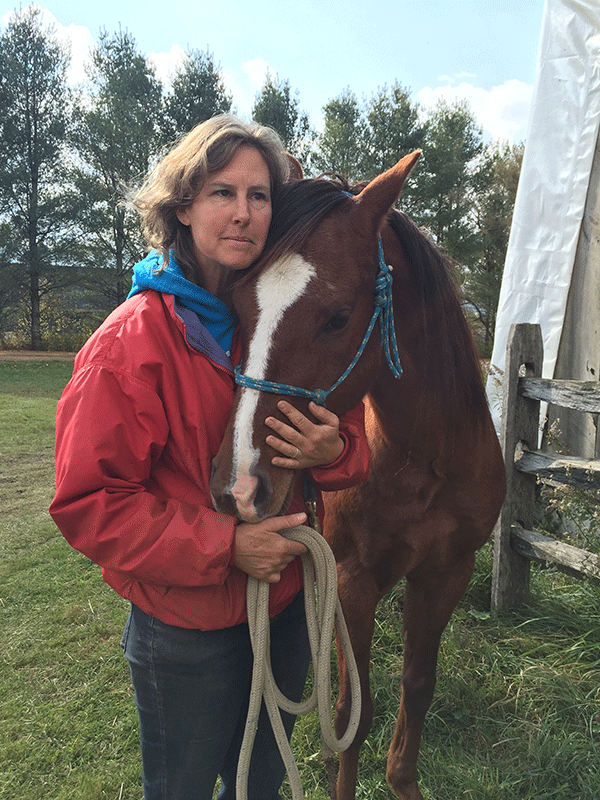You can’t always lead a horse to water
Stephanie Lockhart and Ringo
For the second time this year, The Center for America’s First Horse in Johnson, Vermont is experiencing a water system failure. The 501(c)3 non-profit organization offers programs with the goal of providing life-enriching experiences for people of all ages, using natural horsemanship. Founder Stafanie Lockhart has reached out to ask for support by way of a donation for this project to restore water for the nineteen horses that call the center home.
About three weeks ago Lockhart went to give water to her herd of rare Spanish mustangs when she realized that her spring was dry.
“I thought that maybe because we hadn’t had a lot of rain that it was weather related,” said Lockhart. “The fire department came and filled my spring up for me to give me a couple of days until it refreshed. The next morning, the water was gone. So, the spring is faulty.”
In addition, Lockhart says that from last February to May the water pipes at the Center froze. “We were using 300 feet of garden hose to water horses twice a day in the winter,” she said. “It was awful. But we got through it and I knew I was going to have to do something before this winter came.”
When she realized that the system failed earlier this month, Lockhart asked the local well company to explore different options with her.
“The only way we can have reliable year round water service is to put a drilled well in,” Lockhart said, “and the estimate for the well alone was $10,000. That’s a lot of money for a little non-profit here in Johnson.”
Lockhart says that she will also have to redo her driveway due to the equipment that will be brought in and digging that will have to occur. These costs will add about another $1,500 to the total expenses. “We have a GoFundMe account set up,” Lockhart said. “Also our website is active and people can donate through there as well. I think we are going to have to raise the limit on our goal though, because I didn’t count in fees for PayPal and GoFundMe and the estimate is actually going up, the more information I get. So I think we’re going to need more than $10,000.”
Thanks to a variety of fundraising attempts, it now appears that Lockhart’s goal is within reach “The good news is we’re really active on social media and we’ve raised, at this time, 65 percent of our goal in 10 days,” said Lockhart, who also credits great media coverage of the situation throughout Vermont.
“I’ve got somebody helping write a grant for an urgent need fund,” she said. “So there’s a possibility—I mean you never know with grants—for some money there. I’ve got people doing their own little fundraisers for us and the community is really stepping up to the plate to help.”
Lockhart has been working in the horse world as a professional for 25 years, and says that her good reputation combined with the nature of the work done at her organization is helping to encourage donations.
“Because these are rare horses, this is part of a conservation project to educate people about this breed of horse,” said Lockhart. “These were the first horses that came to America. There’s only about 3000 of them left in the world, and I have one of the largest herds in the east coast. Although I’m not breeding horses, I do the education/promotion piece of it and work with people all over the country.
“We’re not just this un-established facility and people are recognizing that and it’s been really incredible for me to have the feedback that I have from people nationally, not just here in Lamoille county,” said Lockhart. “I’ve gotten donations from coast to coast—people who heard about us or saw us on Facebook and have nice things to say about the work we’re doing. That has meant almost as much to me as the donation itself, because this has been truly a labor of love to do this, and it’s a lifestyle. It’s not just a job.”
The organization is focused on running year-round programs for all ages working with horses in ways that are natural for them. Lockhart says this means using nonverbal communication, including body language and energy.
“I have a special focus of working with children,” Lockhart said. “I work with all populations of children.”
Lockhart embraces the therapeutic benefits that people are able to access by working with horses, particularly for children who might have experienced trauma, are in foster care or need special support.
“I really work with bringing kids together with horses to learn all of those important life skills that horses can teach us,” Lockhart said, “like responsibility, self esteem, confidence, communication. All of that is done through natural horsemanship and that is something that we start on the ground first and then we transfer all of those skills and ideas to riding.”
Right now, these children are the ones who are mainly volunteering to provide water to the horses. Lockhart has a well up her driveway that they use to fill a trough of water and drive it down in her truck. The children then bail the water out to the troughs for the horses. Daily, volunteers are hauling about 250 gallons of water for the horses. With winter setting in soon, Lockhart must move quickly to raise funds to have a reliable year round water source available. The well will not be a resource when the outside temperature stays at freezing for a few days so receiving funding is time-sensitive, says Lockhart.
“By Nov. 1 I would like to know that I have an appointment on [the well company’s] schedule to start drilling,” Lockhart said.
Information on donating can be found on the organization’s website at: www.centerforamericasfirsthorse.org/ or at www.gofundme.com/zd5zfrhw
By Sunday, Oct. 25, the GoFundMe page had reached $7,300 in donations.
Marilyn joined the Basement Medicine staff in Spring 2015 as a staff writer and managing editor.




